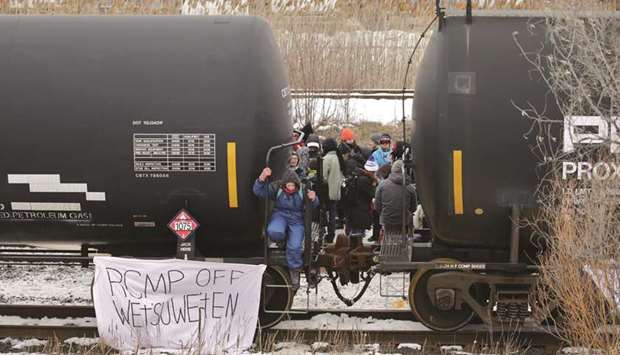Canada’s Liberal government has said it is deeply concerned about protests by aboriginal activists that are blocking some key railway lines but rejected a call to send in the police.
Indigenous communities opposed to the construction of a gas pipeline project in British Columbia started interrupting rail traffic last week.
Canadian National Railway Co, the country’s biggest railroad operator, is shutting operations in Eastern Canada.
“I am deeply concerned about protests that deliberately prevent the operation of railways through illegal activity,” Transport Minister Marc Garneau told a news conference late last week.
“It is about people’s jobs and livelihoods and about the transport of key supplies like food, propane, heating oil and chemicals for water treatment, (and) agricultural products for export,” he said.
The Association of Canadian Port Authorities said some ports were turning away vessels and shippers were beginning to reroute some cargo to the United States.
Superior Propane, Canada’s largest provider of propane, forecast critical supply shortages would start in the coming days.
Prime Minister Justin Trudeau acknowledged what he said had been “a really difficult week” but dismissed opposition calls to deploy the Royal Canadian Mounted Police to end the protests.
“Obviously we are not the kind of country where politicians get to tell the police what to do in operational matters,” he told reporters.
“We will ensure that everything is done to resolve this through dialogue and constructive outcomes.”
Trudeau came to power in November 2015 promising to improve relations with Canada’s indigenous bands, many of whom complain they are marginalised and economically deprived.
Although some groups claim to have a veto over economic development on their lands, a court said last month they had no such right.
The two cabinet ministers in charge of aboriginal affairs are preparing to meet with local indigenous bands in the provinces of Ontario and British Columbia.
Garneau noted that blockades in British Columbia and Manitoba had already been removed.
The most damaging protest is near Belleville in the Ontario, the most populous of Canada’s 10 provinces.
Canadian National has won court injunctions to end the action but the Ontario provincial police, responsible for enforcing the measures, has so far not acted.
Andrew Scheer, leader of the official opposition Conservative party, said that unless the government ended the protests it would “be setting a dangerous precedent that a small few can have a devastating impact”.
International / Canada
Canada very worried about indigenous’ railway protests, rules out sending in police

Supporters of the indigenous Wet’suwet’en Nation occupy railway tracks as part of a protest against British Columbia’s Coastal GasLink pipeline, in Toronto.
